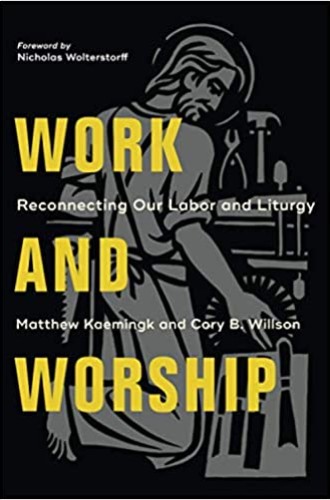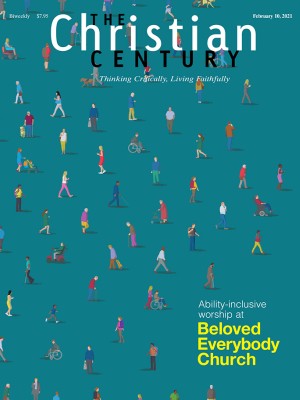When I was a college student in Chicago, I worked on a small paint crew. Every morning, my boss, Vinny, a devout Christian, greeted me at 6:30 with an old plastic carafe filled with off-brand coffee. I would pour myself a bitter cup as we talked about our common faith and the work at hand. No matter how reluctant I felt to begin a long shift, Vinny would remind me that “what we do with our hands matters as much as what we store in our minds.” Yes, we were doing our job. But more importantly, we were offering ourselves to the Lord.
Matthew Kaemingk and Cory B. Willson speak to the deep divorce that so often exists between work and faith. Our Sunday rhythms are spiritually disconnected from our Monday routines, and Work and Worship seeks to bridge this divide. The authors, both respected scholars in the Reformed tradition, uphold the importance of sound theology while simultaneously proposing a move from theory to practice, from theological musings about work to an embodied faith. “Theologies of work matter, but they need to be sung and prayed,” they write. “They need to enter our bones.”
Read our latest issue or browse back issues.
Kaemingk and Willson seek an integrated understanding and practice of worship that brings together our Sunday gatherings with our weekday commutes. Workers “do not sit at the table and read textbooks about theological ethics.” Instead, Christian workers must develop an understanding of work and faith that speaks to their lived and felt reality; they need to “see it, taste it, smell it, pass it, and watch it take on flesh all around them.” Work and Worship is a step in this direction.
What the book hopes to help readers achieve is less like an intellectual ascent and more like the tedious work of weaving together two pieces of fabric—faith and work—that have been ripped apart. Following this illustration, the authors identify the thread used to mend together these torn pieces: worship and prayer. Yes, we must have cognitive understanding in order to sew. But this knowledge morphs into practice as we weave the rhythms of Sunday into the labors of Monday, week after week.
The authors accomplish this task in a fairly straightforward manner. The first part of the book focuses on the divorce between work and worship, diagnosing it as a sociological and pastoral divide rather than a matter of location. In our current era, when both work and worship have relocated to the home for many Christians, Kaemingk and Willson’s description of the problem remains startlingly accurate. Using Zoom for both our jobs and our worship life doesn’t automatically help us bridge the gap between the two.
In the middle section of the book, Kaemingk and Willson explore the “interwoven nature of work and worship in the Old Testament and the early church.” For example, they look at the practice of first fruits in Mosaic law and examine the language of “God’s hands” and “our hands” in the Psalms, drawing a prescription for Christians today. While most discourses through scripture and the patristic writers would land in heavily theological jargon, Kaemingk and Willson stay true to their course, keeping the material informative without simply offering another “theology of work.”
The book concludes with the long-standing liturgical pattern of the church: gathering together, participating in the Lord’s Table, and then scattering out into the world to continue the work begun together in worship. This application emphasizes the primary goal of Work and Worship: transformation. For Kaemingk and Willson, work becomes worship as it is rooted in our unity with Christ. This unity, when expressed through the pattern of gathering, participating, and sending, offers an opportunity for true, costly reconciliation among the body of Christ.
Kaemingk and Willson offer a refreshingly deep pastoral voice. Seeking to heal this ecclesial ailment, their theological musings and insight are not detached from the lives of workers who spend the majority of their time outside of the church and Christian academy. Work and Worship is not a step-by-step guide to connecting corporate worship to the workweek. Instead it offers a framework in which to reenvision the triangular relationship between faith, labor, and liturgy.
Kaemingk and Willson have taken up a daunting project: within an increasingly pluralistic society, they have dug deep into the Reformed tradition to bring forth this text. Their theological commentary, understanding of work, emphasis on the priesthood of all believers, and ample footnotes all point readers to Reformed scholarship. Like their mentor Richard Mouw, the authors bring Reformed theology into our present moment and apply it with tact and wisdom.
Work and Worship contains little commentary from non-White scholars. There are citations of Black Reformed scholars like James Cone and a handful of references to global church traditions, but the text primarily lends itself to the experience of the authors, who are White Reformed churchgoers. Questions remain for readers who find themselves apart from this reality, especially those who are harmed by racism or economic injustice. The book has little to say, for instance, about the importance of equal compensation, poor working conditions, the wage gap between affluent and marginalized communities, and the impact these injustices have on one’s understanding of work.
To be clear, Kaemingk and Willson make no claim to have written a standalone text. From the opening paragraphs, they affirm that their book should be read alongside a diverse list of others. While one may critique the authors for a lack of inclusion, Kaemingk and Willson do not claim to speak to the nuanced, complex experiences and social locations of all Christians in America. Instead, they dig into their roots and produce a text beneficial for their worshiping community.
With all this in mind, the potential readership remains surprisingly broad. Those who are closer to the Dutch Reformed tradition may be more familiar with the book’s underlying theology. Yet Kaemingk and Willson have crafted a brilliant text that will inform Christians across places and vocations for years to come as we collectively reimagine the relationship between work, faith, and worship. Work and Worship is appropriate both for seminary classrooms and church small groups. It’s a book to recommend to your pastor and your coworkers. I know I’ll be sending a copy Vinny’s way.






